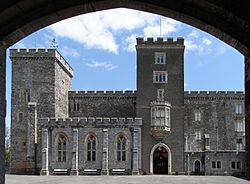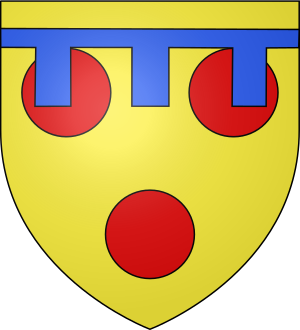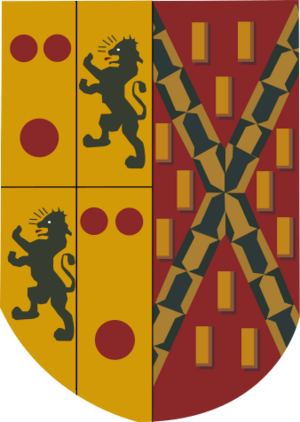Philip Courtenay (died 1406) facts for kids
Quick facts for kids
Sir Philip Courtenay of Powderham
|
|
|---|---|

Powderham Castle, west front. The leftmost tower and great hall within the high central block were built by Sir Philip Courtenay, circa 1390.
|
|
| Born | c. 1355 |
| Died | 29 July 1406 |
| Noble family | Courtenay |
| Spouse(s) | Anne Wake |
| Issue | Richard Courtenay Sir John Courtenay Sir William Courtenay Agnes Courtenay Margaret Courtenay |
| Father | Hugh Courtenay, 10th Earl of Devon |
| Mother | Margaret de Bohun |

Sir Philip Courtenay (born around 1355 – died July 29, 1406) was an important figure from Powderham Castle in Devon, England. He was the fifth son of Hugh Courtenay, who was the 10th Earl of Devon.
Philip Courtenay started a new branch of the Courtenay family, known as "Courtenay of Powderham." His family lived at Powderham, which was a small estate before he took it over. Meanwhile, his older brother's family, the Earls of Devon, continued to live at Tiverton Castle and Okehampton.
Contents
Who Was Sir Philip Courtenay?
Sir Philip Courtenay was one of eight sons born to Hugh Courtenay, 10th Earl of Devon (1303–1377). His mother was Margaret de Bohun, whose mother, Elizabeth Plantagenet, was a daughter of King Edward I of England. This means Philip had royal connections through his mother's side.
Philip Courtenay was known for being a skilled leader in both naval (sea) and military (land) battles. He fought in the war against Spain. He was with Edward the Black Prince, a famous English prince, at the important Battle of Najera. Before this battle, Philip was made a knight, along with his brothers Peter and Hugh.
After returning home, Sir Philip became the Admiral of the West on October 7, 1372. This meant he was in charge of defending the western coast of England from pirates. He held this job until July 16, 1376. In 1373, he led a large group of supply ships to Gascony, a region in France. During this trip, his forces captured the Castle of Gurry.
Later, Philip and his brother Peter were captured by the Spanish during a battle. Two businessmen from Bristol paid a large amount of money to free them. In return, these businessmen were allowed to trade without paying customs taxes.
On March 8, 1380, Philip was again made Admiral of the West until 1381. In February 1383, he became the Lord Lieutenant of Ireland, which meant he was the King's main representative there. He served King Richard II of England for 10 years. He had some disagreements with the King's favorite, Robert de Vere, and also with the Archbishop of Dublin.
Land and Property
Sir Philip Courtenay also served as the Steward of Cornwall during King Richard II's reign. He was given a pension of £100 for life by King Edward III, which King Richard II confirmed. He also received payments from the Duchy of Cornwall.
King Richard II also made him the Keeper of Dartmoor Forest in 1370. He was given many large estates in Devon starting in 1380. In 1389, he became the Lord Warden of the Stannaries, which meant he oversaw the tin mines in Cornwall and Devon. He also received the Royal Manor of Haslebury Plucknett for six years. In 1391, he and his wife were given the manors of Dartmoor and Bradninch. All these land deals were later confirmed by King Henry IV.
Military Experience and Politics
By 1399, Sir Philip was a very experienced soldier. He was called upon to help stop a revolt in Wales. He also helped arrange for soldiers and horses to be transported for expeditions to Brittany in 1402 and against the King of Scotland in 1400.
As a politician, he spoke up about ships that were not being used in the docks. He advised King Henry IV to use the skills of men from the West Country to prepare supplies for battles against France in 1402. Sir Philip was also part of the King's Council in 1405.
Even though he faced financial difficulties while governing Ireland, he was cleared of any wrongdoing and pardoned by the King in 1393. However, some people complained about his actions. For example, Sir Thomas Pomeroy got back some property he had lost in Exeter in 1402.
Brief Imprisonment
In November 1402, Sir Philip was briefly held in the Tower of London. He was later released after agreeing to pay a large sum of money as a guarantee.
Inheriting Property
Philip was lucky to receive property when his relatives passed away. In 1357, he was set to inherit the manor of Moreton after his brother Thomas died. In 1374, he gained Broadwindsor and Cadleigh when his brother, Sir Peter Courtenay, passed away. He also inherited the right to Honiton and Nuneham Courtenay, and East Coker. His father, the Earl, left him 100 marks in his will.
In 1377, Sir Philip gave back the rights to Honiton and East Coker to Exeter Cathedral. This was to help build a memorial for his father. His mother also left him seven manors and her chapel in 1391.
Philip was given Powderham Castle by his mother when she died in 1391, along with seven other manors. When he died on July 29, 1406, his son Richard took over. At the time of his death, Philip owned many properties across Dorset, Somerset, and Devon. In 1405, his income was estimated to be £140 per year.
Family Life
Sir Philip Courtenay married Anne Wake. She was the daughter of Sir Thomas Wake of Blisworth, Northamptonshire. Together, Philip and Anne had three sons and two daughters:
- Richard Courtenay (died 1415), who became the Bishop of Norwich. He was their oldest son.
- Sir John Courtenay (died before 1415), their second son. He passed away before his father and older brother. He married Joan Champernoun (died 1419). They had two sons: Sir Philip Courtenay (born January 18, 1404 – died December 16, 1463), who inherited Powderham from his uncle Bishop Richard Courtenay, and Sir Humphrey Courtenay.
- Sir William Courtenay.
- Agnes Courtenay, who married Sir Otes Champernoun.
- Margaret Courtenay, who married Sir Robert Cary. Robert Cary was a Member of Parliament for Devon twelve times. They had a son named Philip Cary.
 | Selma Burke |
 | Pauline Powell Burns |
 | Frederick J. Brown |
 | Robert Blackburn |


